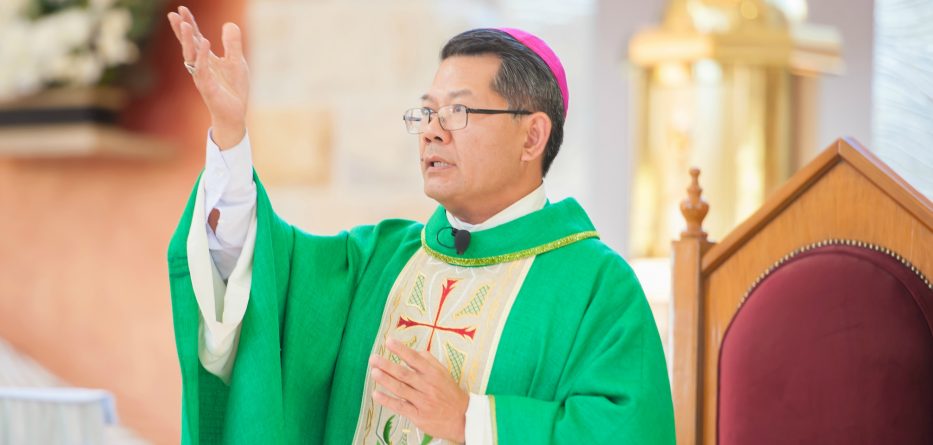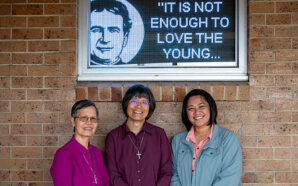Most Reverend Vincent Long Van Nguyen OFM Conv DD STL, Bishop of Parramatta
Homily for the 18th Sunday in Ordinary Time Year B 2018 at St Patrick’s Cathedral, Parramatta
5 August 2018
Dear sisters and brothers,
Nostalgia, that is, yearning for the past, whether real or idealised, is a powerful sentiment. When people experience loss and despair, they tend to succumb to the temptation of nostalgia. They not only yearn for the good old days, but also resent those who are deemed responsible for their loss. Thus, slogans like “Let’s take back our future” or “Make our country great again” often indicate an attempt to recover our world that is gone, if indeed it ever existed in the 60s, 50s or further back in time. They reflect a sense of resentment towards other people whom we think take what belongs to us.
Scriptures warn us against the lure of nostalgia. We can cling to the past in such a way that we fail to see what God is doing in the present. We can hold onto old memories to such an extent that they block the new future we are meant to embrace.
What God wants for us is not safety, security and comfort but growth and transformation through whatever life throws at us. Thus, Scriptures invariably encourage us to walk the unknown pathways ahead, with courage, with perseverance and trust in the God of the journey.
In the first reading today, we hear the story of God’s people succumbing to the temptation of nostalgia. Faced with the unknown and hostile wilderness, the people of Israel yearn for the good old days; they want to go back to Egypt. They prefer the predictable past to the unknown and uncertain future. They’d rather eat meat and bread to their heart’s content than to starve in the wilderness. God’s response is to provide them with manna, which is meant to sustain them for the journey.
Manna is above all a sign that God will not fail them but will lead them beyond the pain of the present to the hope of the future. It is not a replacement of the food of Egypt. Rather, it is the food that enables them to accomplish the exodus into freedom. In other words, God’s people are meant to look beyond their physical needs and commit themselves to a journey of spiritual transformation.
This is also the message of Jesus in the Gospel story. In the previous episode last Sunday, Jesus fed a hungry crowd with the loaves and fishes. But this meal was not meant simply to satisfy their physical hunger. It was meant to foreshadow the divine hospitality and abundance of the Kingdom. So much so that those who partake of God’s meal have to rise to a new level of living the divine generosity and fidelity. What transpired, however, was the people’s failure to grasp the meaning of Jesus’ miracle.
Instead of rising to a new level of consciousness, or in the words of Paul in the second reading “letting their mind be renewed by a spiritual revolution”, they were still stuck in shallow search for temporary relief. This is why Jesus was at pains to tell them “Do not work for food that cannot last, but work for food that endures to eternal life.”
He goes on to compare the manna of old with the real bread from heaven. Manna was food for the exodus from slavery; but he himself is the food for the new exodus into freedom, liberation and wholeness. Manna in the desert foreshadows the real food of life that Jesus would give to us at the table of the Eucharist. He is the bread of God, which comes down from heaven and gives life to the world.
Brothers and sisters,
We live in uncertain and challenging times. The temptation to go back to the proverbial good old days is as real for us today as it was for God’s people wandering in the desert. But as Pope Francis challenges us in the Joy of the Gospel, it is not time for us to raise our drawbridges. It is not time for us to cling to our security or to retreat to our soap bubbles. Our exodus journey is daunting, disorientating and challenging.
In the pope’s words, we shall be “bruised, hurting and dirty.” The wind of secularisation has blown away what’s left of our defences. We are cut loose from the secure moorings of the past and launched into the treacherous waters of the future. Nevertheless, it is time not of fear and nostalgia, but of faith and courage as we are called to journey in the new exodus.
It is in our human nature to cling to what we know, especially when the alternative is uncertain. They say better the devil you know than the devil you don’t. Yet our call is the call not to remain anchored in calm shallow waters. It is a call to launch into the deep, with everything that it entails. We cannot be the disciple of Jesus and stay put. Discipleship is a journey that demands courage because it forces us to abandon security in favour of vulnerability, self-interest in favour of passion for justice.
Let us pray that we have the courage to respond to God’s call to live our discipleship authentically. May we learn to be the Church that accompanies one another on the missionary journey of witness, service and solidarity.
May Christ the bread of life nurture and sustain us on that journey.








